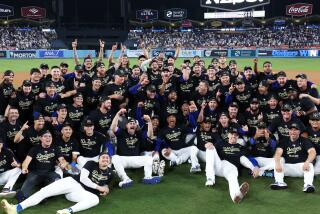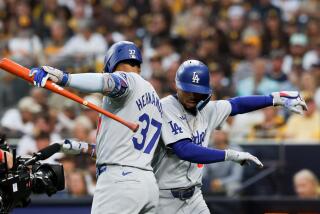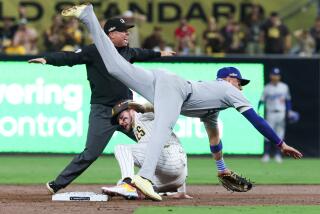Cubs Play Out Their Sequel to Nightmare at the Murph : Baseball: Padres rally with the help of fielding foibles by Bell and Salazar to beat Chicago, 6-2.
- Share via
SAN DIEGO — This might seem like paradise to many out-of-towners, but pardon the Chicago Cubs for wishing an earthquake would dump San Diego Jack Murphy Stadium into the Pacific.
The Cubs certainly had their share of good times here over the years, but for some reason, every time they start to feel comfortable in San Diego, something like Saturday’s game comes around, resurrecting memories of that ground ball that went through Leon Durham’s legs during the 1984 playoffs.
On a brilliant Saturday afternoon at San Diego Jack Murphy Stadium, the Cubs found another peculiar way to lose to the Padres, this time 6-2.
“I’ll tell you,” Padre right fielder Tony Gwynn said, “it was like deja vu all over again.”
After George Bell’s solo homer in the top of the sixth inning, the Cubs were cruising along with a 2-0 lead when those acrid memories came flooding back, tormenting the abundance of Cubs’ fans in the crowd of 23,557.
“It seemed like the whole crowd was filled with Cubs’ fans,” Padre left fielder Thomas Howard said. “Cubs (and) Padres fans were arguing the whole game. It was getting pretty heated.”
It was nothing but some harmless quarreling until Howard did his resurrection of Tim Flannery, and left fielder George Bell did his imitation of Durham.
The Padres, who got five harmless hits off Cub starter Les Lancaster through the first five innings, opened the sixth with Scott Coolbaugh’s double over the head of right fielder Andre Dawson, who appeared fooled by the ball.
It was Bell’s turn next.
Howard lined an 0-1 fastball into left field. Bell broke back toward the wall, put his glove up, dropped his shades and watched the ball drop into the pocket of his glove. He then squeezed his glove, looked inside and saw nothing. He looked to the ground, then up in the air, wondering if the ball simply had vanished.
Little did he realize the ball had popped into his glove, out of it and over the fence for a home run, the first of Howard’s major league career.
“It hit the top of my glove and went out, I think,” Bell said afterwards, still not quite sure what happened. “The fence is kind of flat. When you run into the wall, you push the wall. It goes a foot or two back when you hit it.
“The ball went over. Somebody told me it would have hit the wall if the wall wouldn’t have moved.”
Whatever.
“I knew I hit it good,” Howard said, “but the wind was blowing in, so I didn’t know if it was good enough. Obviously, it was just enough. I saw it hit George Bell’s glove and go over, and I just said, ‘Thank you.’
“Everybody was all over me when I got back to the dugout, saying how I should go pay George Bell. I said, ‘Hey, I don’t care if it bounced on his head and went over the fence. A home run is a home run.’ ”
Lancaster, making his first start of the season, never was able to get out of the sixth, but he was rescued when Heathcliff Slocumb retired Tony Gwynn with runners on first and second.
As Padre starter Dennis Rasmussen continued to mow down the Cubs, retiring 17 of the last 20 batters he faced, the Padres rallied again in the eighth, this time off Mike Bielecki, who was pushed out of the rotation in place of Lancaster.
After striking out pinch-hitter Tom Lampkin, Bielecki walked Bip Roberts. Tony Fernandez followed with a single to left field. Cub Manager Jim Essian, sensing trouble, went to the bullpen and called upon left-hander Paul Assenmacher to face Gwynn.
Assenmacher did everything exactly as designed, inducing a ground ball to third baseman Luis Salazar, and it appeared momentarily that Gwynn was hitting into his third double play in a week. Of course, his chopper in that fifth game of the 1984 National League playoffs to Ryne Sandberg also looked like a double-play ball, didn’t it?
This time, Salazar picked up the ball, didn’t appear to have a firm grip and threw the ball high and wide of second base, drawing Sandberg off the base. Everybody was safe.
“It obviously hurt us,” Essian said. “It looked like a double-play ball when it came off the bat, then we juggled it, and couldn’t find the handle. Everybody makes errors.”
That brought up Jerald Clark, who was subbing for National League home run leader Fred McGriff (swollen left toe). Clark walked to the plate hitless in his past 15 at-bats, and mired in a two-for-29 slump (.069).
Assenmacher immediately got ahead of Clark with two strikes, and then came in with a slider. Clark, saying later he simply wanted to protect the plate, checked his swing and groaned as the ball hit his bat and rolled toward the left side of second base.
“I said, ‘Oh, no, double play,’ ” Clark said. “Shawon (Dunston) has got all kinds of range, so I figured he’d eat that one up. I just ran as hard as I could trying to beat the throw.”
To Clark’s surprise, he saw the ball rolling into center field for a two-single. Tim Teufel added to the Cubs’ misery with a ground-rule double, and third baseman Scott Coolbaugh, who went two for three with two doubles, added a sacrifice fly for the final margin.
The Padres’ victory snapped the Cubs’ six-game winning streak on the road, their longest since 1974. The victory was the Padres’ 13th at home this season.
Rasmussen, ignored last winter in the free-agent market, raised his record to 3-1 with a 0.71 ERA, allowing eight hits and two runs in eight innings.
Considering Rasmussen is 2-0 with a 1.06 ERA against the Cubs this season, how must they must feel knowing they could have used his talents?
“I thought they might come after me,” Rasmussen said, “but they went after Danny Jackson so fast, they never had any interest. But I’m not even thinking about that stuff now. I’m not holding any grudges. I’m just pitching like I know I can, and if I become a free agent at the end of the year again, they’ll have another chance.”
The Cubs also might be muttering about Coolbaugh. While Coolbaugh was with the Texas Rangers, all he heard during the spring of 1990 was how he was going to be traded any day to the Cubs.
“Everybody was talking about it,” said Coolbaugh, who turned 25 three days ago. “I was supposed to go to the Cubs for (catcher) Damon Berryhill. It was a big thrill they were even talking to me, to tell you the truth. Harry Caray, WGN, it was going to be great.
“But then Berryhill had the rotator cuff surgery, (Ranger third baseman) Steve Buechele broke his wrist, and Texas wanted to keep me. Now, a year later, here I am, and I couldn’t be happier.”
More to Read
Go beyond the scoreboard
Get the latest on L.A.'s teams in the daily Sports Report newsletter.
You may occasionally receive promotional content from the Los Angeles Times.










